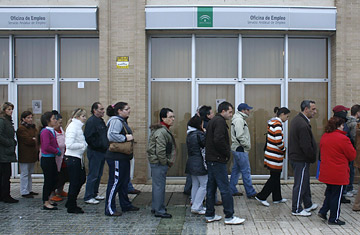
People line up at a government job centre in Seville, Spain
Panasonic will lose $4.2 billion for its fiscal which ends in March. The company says its troubles will cause it to fire 15,000 people. This is the latest in a string of lay-offs by big Japanese companies including Sony (SNE).
It is clear that a number of Chinese manufacturing operations are also letting people go although the businesses in that nation are not always forthcoming about their actions.
The job cut problem in Europe may be even more acute. Even the top tier companies like SAP (SAP) and Siemens (SI) are pushing people out the door to save money. (Read: Is Protectionism Returning to Europe?.)
The U.S. is in the same consumer spending prison that all large nations are. As the middle classes in countries where it sells its exports face the financial crisis, American exports slow. America's own middle class is not spending money so the entire global consumer base has disappeared in just a few quarters.
While the focus of repairing business institutions is mostly on the financial and auto sectors, no one has come up with a key to the lock of consumer spending contraction. The idea that building out infrastructure will do that is probably flawed. The process may create jobs, but that will take a long time. And, those with new employment are more likely to save this wages than spend them. At least that is what recent data show.
Governments in Asia, the U.S., U.K., and E.U. face a larger challenge than the failure of financial institutions. The failure of consumer demand will trample the economy well into next year. The only solution to the problem is to given people extremely enticing reasons to spend money. Whether that is done though tax credits or access to inexpensive credit, governments have to move into the difficult role of building a system to create a series of incentives that make spending money more attractive than saving it. That is nearly impossible because it would certainly involve giving people a dollar to save for every dollar they spend.
Handing out cash can be expensive, although all the governments of major countries are getting deeply into that business.
See pictures of TIME's Wall Street covers.
For constant business updates, go to 24/7wallst.com.
